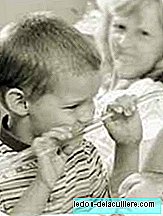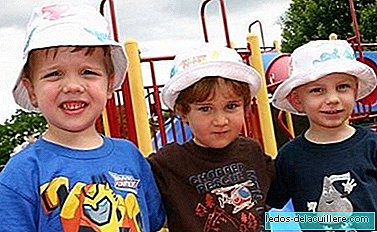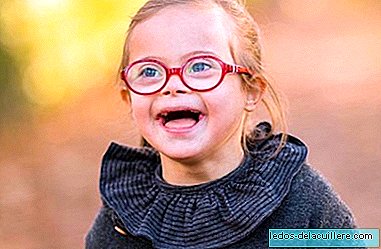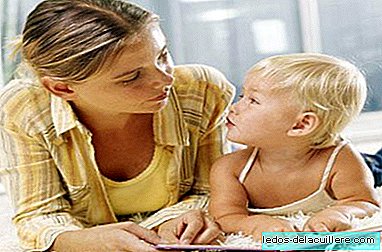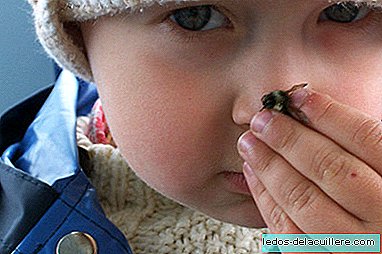
We continue to develop the mothers day theme and today we are going to interview Victoria Martin Cañada , which develops the El Buhico Madre de Día project.
How did you become a Mother of Day?
I am a single mother of 41 years of a wonderful girl of almost 4 years. After studying Social Work I decided to focus on what I liked most: young children. I studied the Higher Degree in Early Childhood Education and soon I had my daughter. After an important personal crisis I discovered by chance the work that mothers do during the day and since then I dedicated myself body and soul to carry out my project of El Buhico.
How would you define a mother by day with your words and experience?
She is an educator very committed to early childhood that offers her home, wisdom and experience so that the children she accompanies continue to feel safe and loved even if they cannot be with their families and in this way they can devote themselves to develop and explore without hurry in A quiet and cozy atmosphere.
Can you tell us how this movement has arrived in Spain?
It has been 12 or 13 years since Inés Gámez exported this model from Germany where he spent three years working as a Mother of Day. In 2006 he created the Waldorf Pedagogy Day Mothers Association and a Mothers Day Network was born a couple of years ago which aims to encompass all, whether Waldorf or not, but always having in common love and respect for young children.
Is there any legislation or regulation for your activity in Spain?
The situation is allegorical, there is no official rule that regulates the activity. Until this regulation arrives, we self-regulate ourselves through the Association of Mothers of the Day and the Network, who are the ones who set the guidelines to follow who we decided to start in this profession. In addition to those already mentioned, associations of mothers by day are emerging throughout the territory. There are many educators who are interested in this profession and there is a great need for support for the creation of new projects, to supervise those that already work, to move towards regulation and to inform about mothers by day.
What requirements must a person who wishes to work as a day mother meet?
To begin with, a formal education that has to do with young children: early childhood education, teaching, pedagogy, child psychology ..., in addition to a first aid course, food handler card, civil liability insurance to take care of children at home, given high as self-employed, or hired by families as household employees or through an association. As for the home, it must be a safe, spacious, warm, bright space that has an outdoor space or a nearby park to access without problems. Also have a room to enable the rest area and the changing table. And of course, safety measures necessary for the protection of children.
Existing that legal vacuum, how is the safety and health of the spaces guaranteed?
Due to the allegiance situation we cannot count on official inspections, as is the case with nursery schools, but we do have the supervisory work that is being carried out from the Network and the different associations of day mothers that are emerging. In addition, as we are open homes for family members, are there better inspectors than them, who are direct witnesses of how we take care of the safety and health of our spaces?
Is there a possibility to carry out specific training for this work?
It will arrive when the activity is regulated. Until then a training is being prepared from the Network. Of course it is not enough to have a degree related to young children, it is essential to constantly self-form and something more than any training can give, a job and deep interior analysis due to the responsibility that It is our job.
What kind of contract is made with the parents, if any?
A commitment document is prepared in which it is indicated that the parents know and agree with the operation of the service, the legal situation of the mothers by day, that they accept any circumstance that could derive from the use of the service and that they share the principles Pedagogical of the same.
Are there communities or municipalities that structure this service in Spain?
In Navarra, a foral order regulates since 2006 the care service for children under three years of age in the caregivers' domicile. For four years he was subsidized by the Navarrese Government through the Casas Amigas association until the cuts arrived. In Euskadi, the Family Nidos for Child Care program was launched in 2011, financed by the Regional Government's Employment and Social Policies Department, but it was very controversial and I don't know if it has continuity.
What benefits does a mother's day service offer to children and their parents?
The process of incorporation, not adaptation, is carried out in the company of the parents and its duration is adapted to what the child marks. It is the space that adapts to the needs, rhythms, tastes, preferences and emotions of children and not vice versa. Being only three or four children have greater access to the educator when they need it, just as she can access children much more easily when intervention is necessary, which is much more difficult in a nursery.
I could say many more but as I would need a lot of space I will end up saying that he receives many more kisses and hugs, in short more love.
We have an advantage over nannies, our professionalism. The mother of day is a person who knows in depth the needs of young children, the development processes they go through, knows how to intervene in conflicts in the most appropriate way for the child, how to detect if there is any problem and that to do before it, how to speak to it, how to approach it, how to observe and what to observe, how to self-evaluate and self-evaluate the service ... Years of study and deepening in the wonderful world of young children.
What are the advantages for parents?
As they are open homes for them, they have the possibility of witnessing the operation of the service, of the educator, of how their child is, of their relationship with the educator. In addition, the flexibility of mothers during the day, both at times and in the possibility that they can adapt to their tastes in the upbringing, such as using cloth diapers or avoiding purees when they start eating solid. The exchange of information is also much greater.
Are you talking a little more about the characteristics of the service, its cost and organization?
It depends on the area and the hours that will be used but to get an idea a little more than a nursery school, although it also depends on what nursery school you compare it to. I do not follow a specific approach but several always having as a cornerstone the respect for the rhythms, preferences, needs and emotions of children. To be specific, I follow Rebeca Wild's non-directive approach, Emmi Pikler's freedom of movement and respect for A.J. Single. Also certain points of the Waldorf and Montessori pedagogies. An indispensable condition to be able to make use of the service is to have an option B, grandparents, uncles, friends with whom to be able to leave their child when, for example, the mother by day is ill or must take care of her own child who is ill. We are looking for more solutions in this regard until we get to involve the administration.
How is time and activities organized?
It depends on the ages of the children, the rhythms they carry and their needs. A flexible schedule is established regarding feeding, grooming and sleep routines and the rest is divided between free indoor play, walks, free play on the terrace, songs, games, stories, free drawing, depending on the weather, your mood, needs ... it has more to do with empathy and intuition than with activity planning.
And the space?
It has to be a large, safe, comfortable space with all the material available to children. Depending on their ages, the space will be separated by zones to prevent the older ones from disturbing or harming the little ones. It is like any home with children but adapted to have 3 or 4, where they have preference.
At what ages is it served?
From four months to four years. It would be preferable if they were in their own homes until at least the first year, but not everyone can afford it, maternity and paternity leave is really scarce.
Does having children of different ages improve or hinder the service?
A lot of camaraderie is created among children of different ages, the elderly love to take care of the little ones and the little ones mimic what the elders do. It definitely improves it.
A mother's day home is like a small big family.





